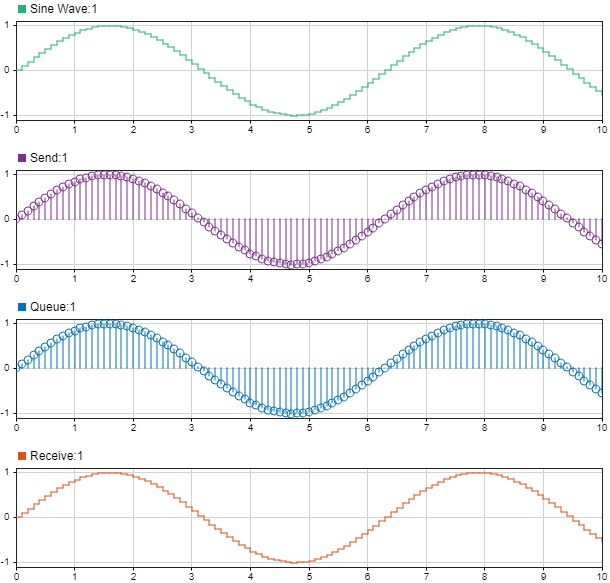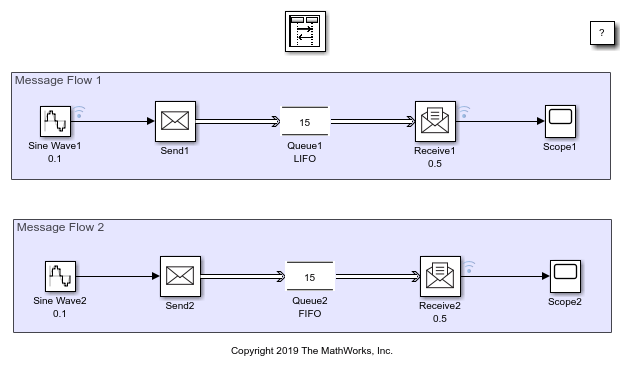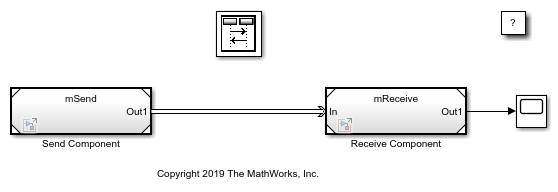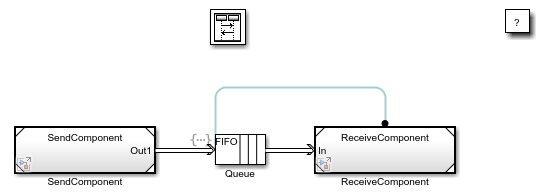Receive
Receive messages
Libraries:
Simulink /
Messages & Events
SimEvents
Alternative Configurations of Receive Block:
Message Receive
Description
The Receive block extracts data from received messages and writes them to the output signal port. If there are no new messages when the block executes, the block uses the Value source when queue is empty value. Receive and Message Receive blocks are identical blocks.
Select
Hold last valueto hold data read from the last message.Select
Use initial valueto write default data.
Examples
Animate and Understand Sending and Receiving Messages
Send, receive, visualize, and animate messages and display message data.
Use a Queue Block to Manage Messages
Use FIFO queue, LIFO queue, and priority queue to sort and store messages and define queue policies.
Establish Message Send and Receive Interfaces Between Software Components
Create message send and receive interfaces, and prepare components for C++ code generation.
Connect Message Receive Interface with Simulink Functions
Synchronize execution with data availability in message-based systems. We show how to model this behavior using events and actions. This example builds on another example, Establish Message Send and Receive Interfaces Between Software Components, where two software components communicate using messages.
Ports
Input
The input port for the message.
Data Types: single | double | int8 | int16 | int32 | int64 | uint8 | uint16 | uint32 | uint64 | Boolean | enumerated | bus | fixed point
Output
Outputs 1 if the block receives a message
successfully, and 0 otherwise.
Dependencies
To enable this port, select the check box labeled Show receive status.
Data Types: double
Output port for the signal.
Data Types: single | double | int8 | int16 | int32 | int64 | uint8 | uint16 | uint32 | uint64 | Boolean | enumerated | bus | fixed point
Parameters
Select this check box if you use an internal queue to receive messages.
Programmatic Use
Block Parameter:
UseInternalQueue |
| Type: character vector |
Values: 'on'
| 'off' |
Default:
'on' |
Select this check box to choose between two queue overwriting policies.
If you select the check box, an incoming message overwrites the oldest if the queue is full.
If you clear the check box, the block does not accept new messages if the queue is full.
Dependencies
This parameter is visible when you select the box labeled Use internal queue.
Programmatic Use
Block Parameter:
QueueOverwriting |
| Type: character vector |
Values: 'on'
| 'off' |
Default:
'on' (for Simulink) and 'off' (for SimEvents) |
Specify message queue capacity. The queue length can be specified as a
positive integer between 1 and 226-1 (both included).
Dependencies
This parameter is visible when you select the box labeled Use internal queue.
Programmatic Use
Block Parameter:
QueueLength |
| Type: character vector |
Values: '16'
| scalar |
Default:
'16' |
The block supports three message sorting policies:
First-in-first-out (
FIFO) — The oldest message in the storage departs first.Last-in-first-out (
LIFO) — The newest message in the storage departs first.Priority— Messages or entities are sorted based on their priority.The priority queue can be used only when the Overwrite the oldest element if queue is full check box is cleared.
Note
Priority queue accepts only non-bus scalar and it does not support
fixed pointdata type.
Dependencies
This parameter is visible when you select the box labeled Use internal queue.
Programmatic Use
Block Parameter:
QueueType |
| Type: character vector |
Values:
'FIFO' | 'LIFO' |
'Priority' |
Default:
'FIFO' |
Choose the direction of sorting messages based on priority.
Ascending— Messages with smaller priority values appear in front of the queue.Descending— Messages with greater priority values appear in front of the queue.
Dependencies
This parameter is visible when you select the box labeled Use internal queue andQueue type > Priority.
Programmatic Use
Block Parameter:
PriorityOrder |
| Type: character vector |
Values:
'Ascending' | 'Descending'
|
Default:
'Ascending' |
Select this check box to show whether a message was received. If this
check box is selected the block outputs 1 if it receives
a message successfully, and 0 otherwise.
Programmatic Use
Block Parameter:
ShowQueueStatus |
| Type: character vector |
Values: 'on'
| 'off' |
Default:
'off' |
Enter an initial data value for the queue before the arrival of the first
message. The default value [](unspecified) is treated as
0 with data type double.
To use this block to initialize a nonvirtual bus signal, specify the initial value as a MATLAB® structure. For more information about initializing nonvirtual bus signals using structures, see Specify Initial Conditions for Bus Elements.
Programmatic Use
Block Parameter:
InitialValue |
| Type: character vector |
Values: '[]'
| scalar |
Default:
'[]' |
Specify the value to receive when received message queue is empty.
Hold last value(default) — Holds data read from the last message.Initially, if the block tries to receive a message and fails, it outputs the initial value.
Use initial value— Writes default data.
Dependencies
This parameter is visible when you select the box labeled Use internal queue.
Programmatic Use
Block Parameter:
ValueSourceWhenQueueIsEmpty |
| Type: character vector |
Values: 'Hold last
value' | 'Use initial value'
|
Default: 'Hold last
value' |
To inherit the sample time, set this parameter to -1.
See Specify Sample Time for
more information.
Programmatic Use
Block Parameter:
SampleTime |
| Type: character vector |
Values: '-1'
| scalar |
Default:
'-1' |
Block Characteristics
Data Types |
|
Direct Feedthrough |
|
Multidimensional Signals |
|
Variable-Size Signals |
|
Zero-Crossing Detection |
|
Alternative Configurations
The Message Receive block selects the Use internal queue parameter, sets Queue type to FIFO and Queue length to 16.
Libraries:
Simulink /
Messages & Events
SimEvents
Extended Capabilities
When you generate code for a model that uses a message queue and has multitasking enabled, enable concurrent tasking behavior if that model will be deployed to a multitasking environment. Otherwise, the generated code has the potential for data corruption. You enable concurrent tasking behavior by selecting Allow tasks to execute concurrently on target.
Note
Receive blocks do not support row-major code generation.
Version History
Introduced in R2016a
MATLAB Command
You clicked a link that corresponds to this MATLAB command:
Run the command by entering it in the MATLAB Command Window. Web browsers do not support MATLAB commands.
Select a Web Site
Choose a web site to get translated content where available and see local events and offers. Based on your location, we recommend that you select: .
You can also select a web site from the following list
How to Get Best Site Performance
Select the China site (in Chinese or English) for best site performance. Other MathWorks country sites are not optimized for visits from your location.
Americas
- América Latina (Español)
- Canada (English)
- United States (English)
Europe
- Belgium (English)
- Denmark (English)
- Deutschland (Deutsch)
- España (Español)
- Finland (English)
- France (Français)
- Ireland (English)
- Italia (Italiano)
- Luxembourg (English)
- Netherlands (English)
- Norway (English)
- Österreich (Deutsch)
- Portugal (English)
- Sweden (English)
- Switzerland
- United Kingdom (English)



